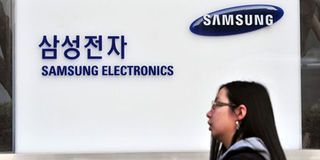Samsung sells off defence, petrochemical units

A woman walks past the logo of Samsung Electronics outside its headquarters in Seoul on January 17, 2012. Samsung Group announced Wednesday the sale of stakes in four petrochemical and defence affiliates for Sh151 billion ($1.7 billion). PHOTO | FILE
What you need to know:
- A 50-percent stake held by Samsung General Chemicals in its joint venture with the French energy giant Total, called Samsung Total, will also be sold to Hanwha, along with Samsung Techwin's 50 per cent holding in a joint venture with French defence firm Thales.
- The sell-off announced Wednesday indicates a desire to streamline the behemoth so as to concentrate on its key profit-making units.
- The founding Lee family has been under growing state pressure to unravel its complex cross shareholdings and make its governing structure more transparent.
SEOUL
Samsung Group announced Wednesday the sale of stakes in four petrochemical and defence affiliates for Sh151 billion ($1.7 billion) as the South Korean giant steps up restructuring efforts ahead of a generational ownership succession.
The sale to the Hanwha conglomerate, which has major petrochemical holdings, is expected to be finalised in the first half of next year, Samsung said in a statement.
The deal involves Samsung Electronics and other group affiliates selling their combined stakes in defence firm Samsung Techwin and Samsung General Chemicals.
A 50 per cent stake held by Samsung General Chemicals in its joint venture with the French energy giant Total, called Samsung Total, will also be sold to Hanwha, along with Samsung Techwin's 50 per cent holding in a joint venture with French defence firm Thales.
It marks the first sale of Samsung affiliates since the group was forced to shed its struggling car-making unit in 1997 during the Asian financial crisis.
SHEDDING LIGHT
Samsung is comprised of dozens of units including Samsung Electronics, the world's top maker of mobile phones and TVs, which earn a collective revenue equal to around 20 per cent of South Korea's annual economic output.
The family-run group currently chaired by Lee Kun-Hee has merged, broken out or newly listed some of its key units in recent years as he prepares to hand over the helm to his son, J.Y. Lee.
The founding Lee family has been under growing state pressure to unravel its complex cross shareholdings and make its governing structure more transparent.
The sell-off announced Wednesday indicates a desire to streamline the behemoth so as to concentrate on its key profit-making units, said Kim Ji-San, analyst at Seoul-based Kium Securities said.
"The deal shows Samsung is determined to shed non-core units deemed not competitive enough globally and to focus on key businesses like electronics, finances, construction and engineering," Kim said.
Samsung Techwin, a developer of security equipment and aerospace technologies, reported a net profit of 133 billion won last year, but has amassed a net loss of 14.5 billion for the first three quarter of this year.
Samsung's restructuring has not always been smooth sailing.
Last week it had to scrap a merger between two major units — Samsung Heavy Industries and Samsung Engineering — due to the spiralling cost of buying back stock from shareholders opposed to the deal.





